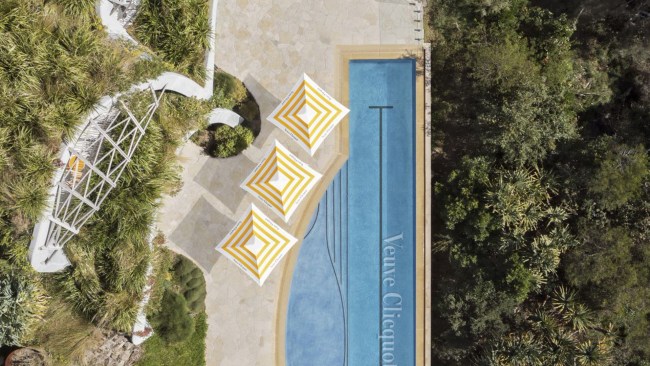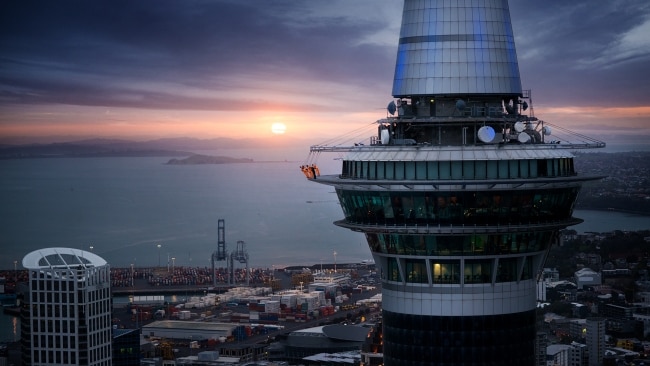Nairobi confidential
THE sense of bush adventure comes early: there are zebras behind the fences at the airport and my mobile phone's global roaming pops up as Safaricom.

THE sense of bush adventure comes early: there are zebras behind the fences at Nairobi airport and my mobile phone's global roaming pops up as Safaricom.
Advertising hoardings on the main road into the city announce Tusker beer and Out of Africa tea. You learn the standard greeting within minutes: Jambo, habari? Hello, how are you?
Very fine, as it turns out. The name Nairobi means "place of cool waters" in Swahili but the capital of Kenya used to be known as Nairobbery a decade ago, such was the rate of street crime and home invasion. In 2002, a brick was thrown through the window of the van in which I was travelling, narrowly missing the driver. The UN has now downgraded its security alert rating for the city, the post-election violence of 2008 has calmed and a new constitution is in place. Even so, I have been in no hurry to return.
But in 2011 there's a feeling of promise in the air, even though during my visit The Daily Nation is filled with spirited editorials and thundering letters to the editor on the shortcomings of the coalition government. You get the feeling Kenyans are passionate about their politics.
With refreshed eyes, I see Nairobi as a green capital, its parks abundant with jacarandas, fan-tail palms and euphorbias, its wide central boulevards named for independence leaders and heroes. Buildings are taller and newer, the roads seem wider, communications are good and the mood appears positive.
In long and lovely Uhuru Park, marabou storks perch on treetops like over-sized Christmas ornaments. I see little litter, civic buildings are well maintained and roundabouts planted with vivid flowers. At 1795m above sea level, the climate here is benign, classified as subtropical highlands, which in essence means the fortuitous state of warm by day, mild by night. Nairobi's not perfect enough for Tidy Town status but is all the more interesting for its slight unruliness and mad traffic.
There's a sense of ceremony here, too, that befits one of East Africa's biggest cities: the black, green and red striped flag of Kenya flaps high and taut on governnment buildings, and the tomb of Jomo Kenyatta, the independent nation's first president, is guarded 24 hours by a roster of red-jacketed guards. Our group's van approaches the monument in a swirl of cars, clapped-out taxis and matatu mini-buses. "Freestyle driving," says Wildlife Safari guide Andrew Kingori with a laugh.
Best garden lunch: Ngong House offers rather zany treehouse, cottage or cabin accommodation on a 4ha estate built around a rambling bungalow at Karen that was once the home of the ethologist and founder of the Amboseli Trust for Elephants, Cynthia Moss. The main house is charming, although the timbered guest lodgings are a bit too quirky for my taste; but if you just want to take a look, book ahead for lunch in the garden by a pool under a canopy of acacias. More: ngonghouse.com.
Best shopping: Be sure to visit Kazuri, where "every bead has a story". Established in 1976, this workshop, on part of the old Karen Blixen coffee estate, employs about 400 local women, mostly single mothers, who fire and handpaint ceramic jewellery made from Mt Kenya clay.
Kazuri items are sold in many shops but at the headquarters you can do a short tour before proceeding to the store where necklaces in glossy rainbow-bright colours are about 1900 Kenyan shillings ($21) and bracelets are about 1200 Kenyan shillings. More: kazuri.com.
Every Sunday, a craft and curios market springs up in the Law Court Building's car park from 8am to 6pm, and the curio shop at Nairobi Serena (see Best Beds) is a fine source of gifts, books and CDs of African music (look for Women of Africa from Putumayo World Music).
Best one-stop emporium: Utamaduni Crafts Centre is set in a two-storey house (close to the Karen Blixen Museum) decorated with bold red and black murals and composed of a series of 18 themed rooms in which vendors sell the likes of beaded jewellery and photo frames, wooden and woven wares, soapstone carvings, clothing fashioned from Swahili kangas and cotton tablecloths and napkins with vivid African motifs.
Bargaining is not encouraged but prices are pretty good and the range is outstanding; allow at least an hour for a thorough browse and have coffee or a light lunch in the cafe, set in a garden busy with birds. More: utamaduni.com.
Best people-watching venue: The Lord Delamere Terrace bar at the Norfolk Hotel is quite the spot for a pink gin. It used to be a dim and clubby joint, full of shabby charm and the ghosts of big-game hunters, but the hotel's new management, the Fairmont chain, has opened it all up and now it looks vaguely like a transplanted European sidewalk cafe, save for the ceiling fans and parade of palms.
The hotel, long known as "the grand dame of Nairobi", dates back to 1904, when Kenya was British East Africa, pith helmets were the headwear du jour, and the guest register was a who's who of safari hands. The central courtyard, around which wings of guestrooms are arranged, is still an oasis of acacia and yellow-barked fever trees, flourishing bougainvillea and hibiscus. More: fairmont.com/norfolkhotel.
Best city safari: Nairobi National Park is a 117sq km reserve on the city's edge, about 7km from the CBD; imagine giraffes in the foreground of your pictures and high-rise buildings as backdrop. Touted as "the only protected area in the world close to a capital city", the park makes a good prelude to a proper safari into the Masai Mara.
Its residents include lions, leopards, cheetahs, hippos and buffaloes, plus myriad varieties of antelopes and hundreds of species of birds (no elephants, sadly). The park is an important breeding facility for endangered black rhinos and also features a Nairobi Safari Walk for up-close viewing, an animal orphanage and Ranger's Restaurant, a big, airy eatery with the bonus of animal sightings in the surrounding bush. More: kws.org; rangersnairobi.com.
Best necking opportunity: The Giraffe Centre is a small wildlife sanctuary at Langata, near the Nairobi National Park, and is run by the African Fund for Endangered Wildlife. Here you have the opportunity to feed pellets to long-lashed Rothschild giraffes while safely standing on a high platform (their tongues are unusually long and slobbery). If you want to buy a memento, pop into the Zoovenir shop.
Nearby is the home of the centre's founder, Jock Leslie-Melville, now a hotel, Giraffe Manor, where the long-necked creatures regularly poke their heads through the upper-floor windows. More: giraffecentre.org; giraffemanor.com.
Best Out of Africa moment: Danish author Karen Blixen, who lived in Kenya from 1914 to 1931 and wrote Out of Africa under the nom de plume Isak Dinesen, tried coffee farming at the foot of the Ngong Hills, and fell in love with adventurer Denys Finch Hatton. Her former bungalow is now in the suburb of Karen and was converted to a museum in 1986.
The mahogany-panelled rooms still contain some of her belongings and furniture, as well as shelves of books, and props and pieces (a gramophone, Corona typewriter, Louis Vuitton trunk and kit worn by Meryl Streep and Robert Redford) donated by the makers of the 1985 movie. (For the record, Karen and Denys looked nothing like Meryl and Robert.) More: museums.or.ke.
Best meat-eater's fantasy: There's no ambiguity about the name. Just 4km from the city centre, Carnivore is billed as "Africa's greatest eating experience", although vegetarians and occasional meat-eaters (like me) would clearly disagree. Nonetheless, it's great for the entertainment value alone. Even the drink coasters are part of the joke: "Let's meat at the Carnivore".
Charred flesh displayed on sword-like skewers is served by roving waiters (camel, crocodile or ostrich, anyone?), a waiter dressed up as a bush doctor proffers cocktail "potions" of vodka, lime, sugar and honey, and the atmosphere sizzles as the meat is cooked over a huge hot-as-hell roasting pit near the entrance. There's a curio shop on site and the zebra-print barbecue aprons make fun souvenirs. More: tamarind.co.ke.
Best dining: I don't have an opportunity to try Talisman this visit but rave reports continue to circulate about its feta and coriander samosas and lamb kebabs. Run by an English couple, and located in a repurposed 1920s colonial bungalow at Karen, Talisman has a nice garden, indoor-outdoor dining, log fires, fab local artwork and, if you feel the need for comfort food, a cracking good fish and chips. More: talismanrestaurant.com.
Best health warning: Proof of yellow fever vaccination was required when re-entering Australia earlier this year. Check with your doctor or a tropical medicine specialist before departure.
Best tip: Take traveller's cheques or a credit card with a low limit; somewhere during my 10-day stay in Kenya, my Visa card was skimmed up to its (thankfully low) limit and used for online gambling. I handed it over only at hotels and reputable shops, and Visa is still investigating. It's a sour note to the trip's end, but would I go back to Nairobi? Yes, in a heartbeat.
Susan Kurosawa was a guest of Wildlife Safari and Emirates.
Checklist
Emirates flies from Australian ports to Nairobi via Dubai; look for seasonal specials and Dubai stopover specials from $US39 ($36) a person a night twin-share (minimum two nights), including airport transfers. More: 1300 303 777; emirates.com/au.
Kenyan-owned Wildlife Safari has been in business for 40 years and offers a range of trips; the company owns a fleet of custom-designed vehicles and employs experienced full-time guides. More: 1800 998 558; wildlifesafari.com.au.



